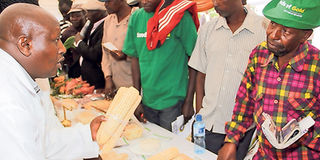We must embrace agro-technology for sustainable farming

Edward Saina, a technical officer at Kalro's Food Crops Research Institute in Kitale gives farmers the essentials of cultivating newer maize varieties, in this past edition of Seeds of Gold Farm Clinic held in Kitale. Seeds of Gold Farm Clinics will certainly bridge the gap between farmers and agricultural experts, farmers and agro-dealers and farmers and new agro-technologies for sustainable agriculture. FILE PHOTO | NMG
What you need to know:
- Most farmers still rely on the traditional ways of doing things, because they still work or they worked for the fore fathers.
- These factors make food production more difficult, hurting the prospects of ending perennial hunger.
- But about 98 per cent of the agricultural activities are rain-fed and highly susceptible to climate change and climate variability.
- Farm mechanisation, use of superior quality seeds, enhanced pest and disease control strategies and relying less on rain-fed agriculture are the essentials that farmers must have to earn more from the soil.
In the last few years, several industries that have recorded tremendous growth, from banking to transport and telecommunication, have widely integrated technology in their operations.
The agriculture sector has recorded growth in the last years, but slower than expected and this is largely blamed on low use of technology that include new seed varieties, farm machinery and information and communication technology.
Most farmers still rely on the traditional ways of doing things, because they still work or they worked for the fore fathers.
But the reality has changed in the sector, with climate change posing the greatest threat to food production. There is increased invasion of crop and livestock farms by new pests and diseases, the weather has become erratic and the soil has degenerated thanks to over-cultivation.
These factors make food production more difficult, hurting the prospects of ending perennial hunger.
Thus, without embracing various forms of agricultural technology, farmers cannot produce more food.
It is for this reason that ‘Seeds of Gold’ Farm Clinic has placed agro-technology at the centre of today’s event in Thika.
The theme of the clinic is “Innovations for sustainable agriculture”.
BRIDGE THE GAP
For many years, the agriculture sector has generally been one of the biggest contributors to Kenya’s economy especially when it comes employment creation — whether directly or indirectly.
But about 98 per cent of the agricultural activities are rain-fed and highly susceptible to climate change and climate variability.
To combat the ever-changing rain pattern and decreases in rainfall, which affect farming activities, farmers in Kenya now have to embrace irrigation solutions, some which we will showcase at the farm clinic.
Also on display will be new seed varieties that are drought-resistant, mature faster and yield more.
A number of pesticides to combat emerging pests and diseases will also be on display and so will be various transport equipment and farm machinery.
Farm mechanisation, use of superior quality seeds, enhanced pest and disease control strategies and relying less on rain-fed agriculture are the essentials that farmers must have to earn more from the soil.
Research institutions such as Kenya Agricultural and Livestock Research Organisation (Kalro) and Egerton University, among many others across the country, have stepped up their activities and are coming up with varieties that are resilient to adverse conditions that affect crops. The institutions also have other innovations that farmers can adopt to enhance their yields.
This edition of the Farm Clinic will certainly help bridge the gap between farmers and agricultural experts, farmers and agro-dealers and farmers and new agro-technologies for sustainable agriculture.





